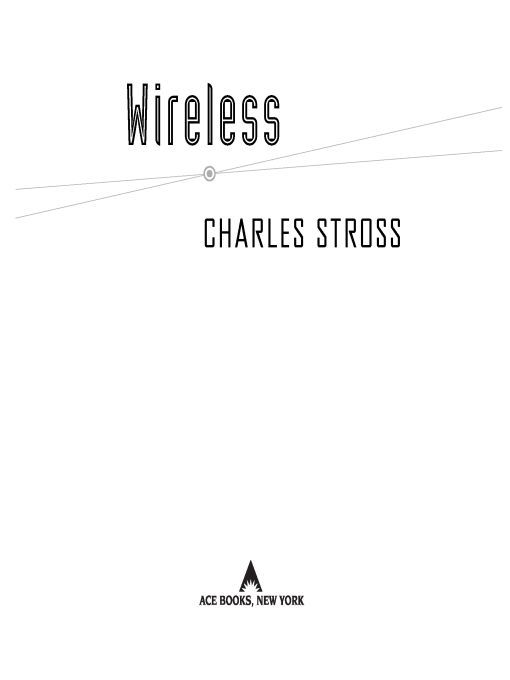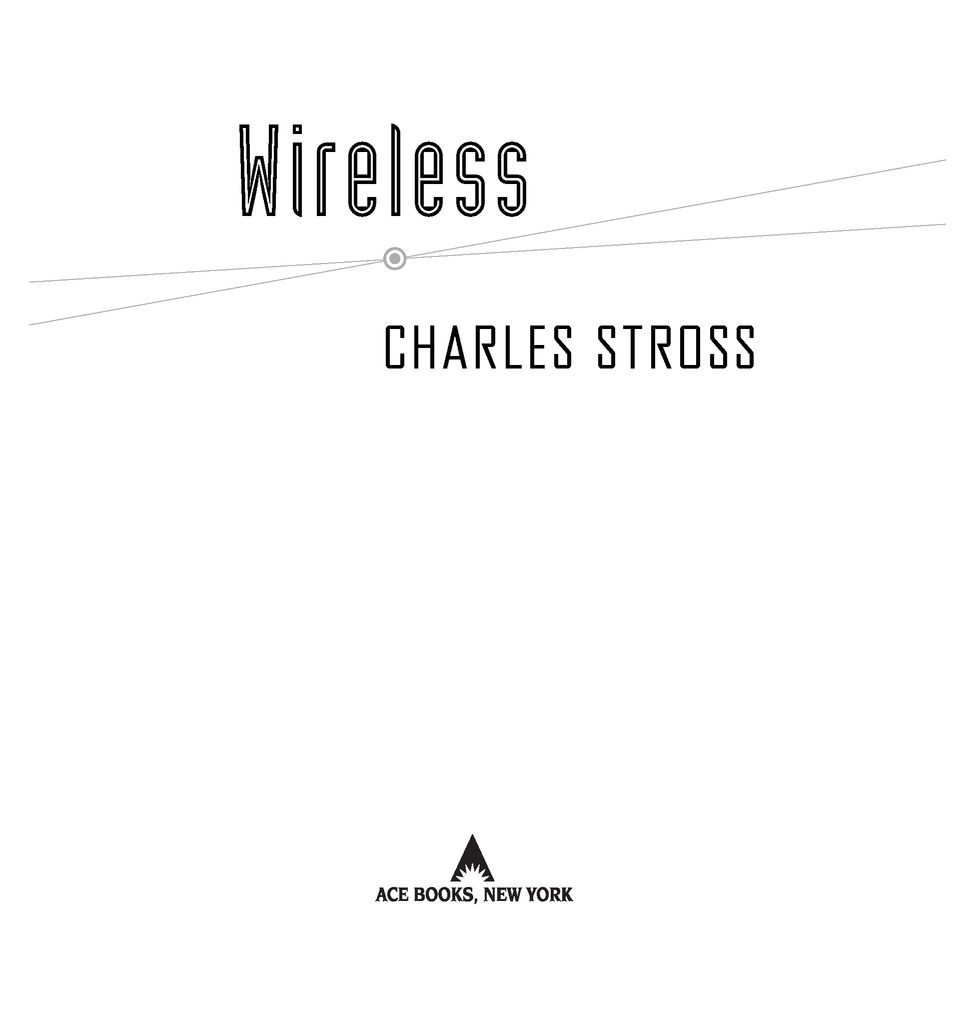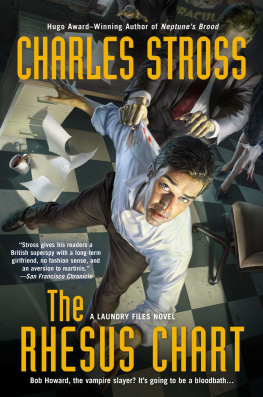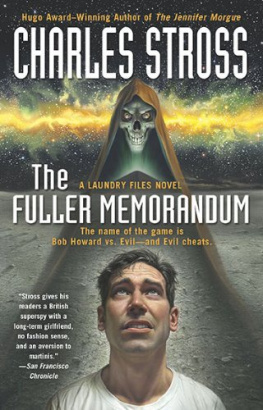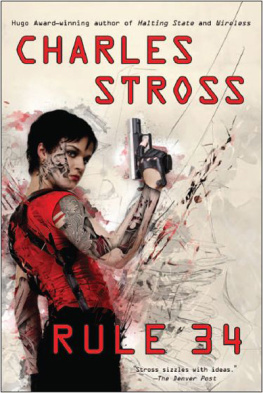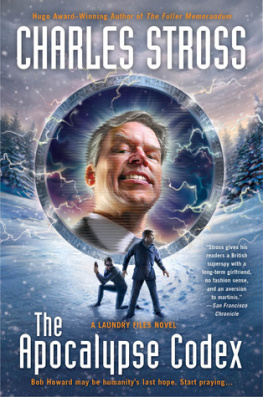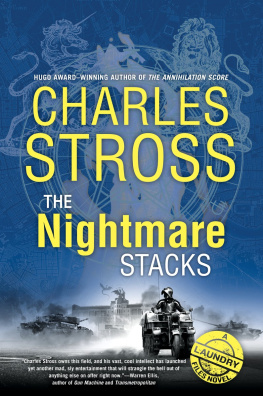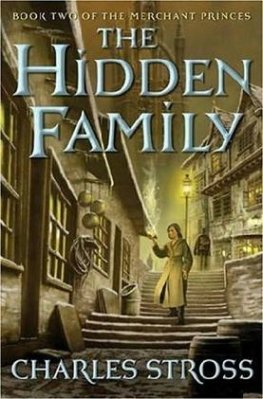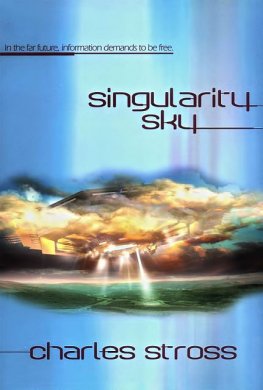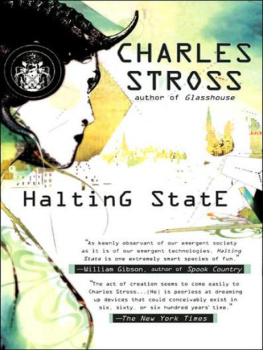Table of Contents
Ace Books by Charles Stross
SINGULARITY SKY
IRON SUNRISE
ACCELERANDO
THE ATROCITY ARCHIVES
GLASSHOUSE
HALTING STATE
SATURNS CHILDREN
THE JENNIFER MORGUE
WIRELESS
For David Pringle, Gardner Dozois,
and Sheila Williams
Introduction
Hello, and welcome to Wireless.
This is not a novel. This is a short-story collection. This is not a short story. This is the introduction to a short-story collection. This is not fiction. This is a sequence of concepts that I am transferring into your conscious awareness via the medium of words, some of which may be false. Danger: here be epistemological dragons...
Im Charlie Stross, and I have a vice I indulge in from time to time: I write short fiction. Ive been writing short stories (in various length factors) and getting them published in magazines for a long timemy first short story in the British SF magazine Interzone came out in 1986and although I dont make much money at it, I still keep doing it, even though these days I write full-time for my living.
Short stories are a famously dead format in most genres of written fiction. Back in the 1950s, there was a plethora of fiction magazines on the shelves of every newsagent: but changes in the structure of the magazine-publishing business killed the fiction markets, and what had once been a major source of income for many writers turned into a desert. Even science fictionwhich has a long tradition of short stories as a major subfield, going back to the 1920s and the pages of Astounding Science Fiction, and which has fared better than other genres in terms of the survival of the monthly magazinesisnt a terribly fertile field to plow. Because of the way the publishing industry has evolved, if you want to earn a living, you really need to write novels: short-fiction outlets, with a very few exceptions, pay abysmally.
It wasnt always thus. The science fiction novel was itself something of a novelty until the 1950s; the famous names of the early-SF literary canonIsaac Asimov, Robert Heinlein, Arthur C. Clarke, and less-well-remembered names such as Fredric Brown and Cyril Kornbluth and Alfred Besterwere primarily short-fiction writers. With dozens of monthly newsstand pulp-fiction magazines demanding to be fed, and a public not yet weaned to the glass teat of television, the field was huge. Video didnt so much kill the radio star as it did for the short-fiction markets, providing an alternative distraction on demand for tired workers to chill out with.
But the SF short-story field survives to this day. Its in much better shape, paradoxically, than other genres, where the form has all but died. It would be hard to describe it as thriving, at least compared to the golden age of pulpsbut science fiction readers are traditionalists, and those of us who write short fiction arent primarily in it for the money: weve got other, less obvious, incentives.
(Actually, Im not sure I know anyone who writes fiction at any length solely for money. If youve got the skill to string words into sentences, there are any number of ways to earn a living, most of which are far less precarious than the life of a freelance fiction writer. At the risk of overgeneralizing, its one of those occupations you go into because you cant not do it, and any attempts to justify it by pointing to commercial success are, at best, special pleading. If Stephen King had failed to get his big break with Carrie, if J. K. Rowl ings first Harry Potter book had sold out its first thousand-copy print run and thereafter gone out of print, Im willing to bet that theyd have kept on writing regardless.)
Speaking for myself, Im an obsessive fiction writer. I write because Ive got a cloud of really neat ideas buzzing around my brain, and I need to let them out lest my head explode. But having ideas is only part of the reason I writeotherwise, I could just keep a private journal. The other monkey riding my back is the urge to communicate, to reach out and touch someone. (Or to lift the lid on their brainpan, sprinkle some cognitive dissonance inside, stir briskly, then tiptoe away with a deranged titter.) Everyone I know who does this job has got the same monkey on their shoulders, urging them on, inciting them to publish or be damned, communicate or die.
If youre a compulsive communicator, nothing gets your attention like feedback from the publica signal saying message received. To many writers, money is one kind of feedback; nothing says message received quite like the first royalty check after your book earns out the advance. It tells you that people actually went out and bought it. (And it pays the grocery bills.) Then there are the reviews, be they brilliant or misguided, or occasionally brilliant and misguided, which tell you a little bit about how the message was received or misunderstood. They dont pay the grocery bills, but they still matter to us.
But the feedback from a novel is slow to arrive, and thin beer indeed after the amount of effort that went into fermenting the brew.
Imagine youve got an office job. You go to work every day, and theres a perk: the office is about ten feet from your bedroom door. (No lengthy commute!) You sit in that officealone, for the most partand write, hopefully without interruption or human companionship. Sometimes you get bored and take a day or two off, or go do the housework, or go shopping. And sometimes you find yourself working there at 10 p.m. on a Saturday night because you took Friday off, and Thursday before it, and your demon conscience is whispering in your ear, reminding you to put in the hours. Youre almost always on your own.
Youll find it generally takes somewhere between a month and a year to write a novelsometimes more, sometimes less. And once its written, you deliver it to your agent or editor, and it disappears for a couple of months. Then it reappears as a job in the publishers production queue, moving in lockstep through a series of well-defined processes on its way to being turned into cartons of finished books. Theres a little wiggle room, but in general if you turn in a book, it will take a year to show up in hardcover (and then another year before its reprinted in paperback).
So: once a year, you get the fanfare and fireworks show of a new book coming into print. And then the reviews and reader comments trickle in, usually over a period of a couple of months. Then the long silence resumes, punctuated by the odd piece of fan mail (a surprising proportion of which is concerned with pointing out the same hugely significant typo on page seventhat escaped both you and your editorsas the previous sixteen e-mails)...
Short stories are different: they push the reward-feedback button much more frequently than novels. (And thats why a lot of us start out writing short stories before we tackle novels.) Theres an addictive quality to writing short stories, like being a rat in a behavioral-science experiment that rewards correct performance of some complex task with a little electric shock to the medial forebrain bundle. Not only do they not take months or years to write (when things are going well, its more like hours or days), but you can send them out to a magazine or anthology editor with some hope of hearing back within a couple of months. Better still, if a magazine decides to buy your story, it can be in print in a couple of months. Push the button harder, rat! Its great training for acquiring the motivation to engage with the bigger, slower job of writing a novel.

